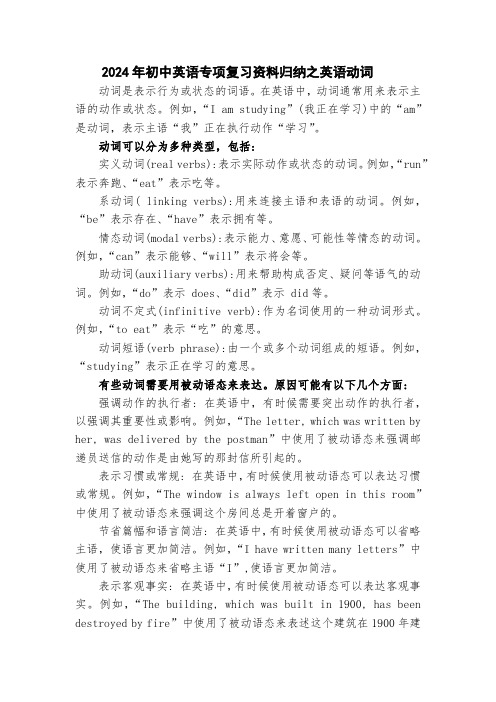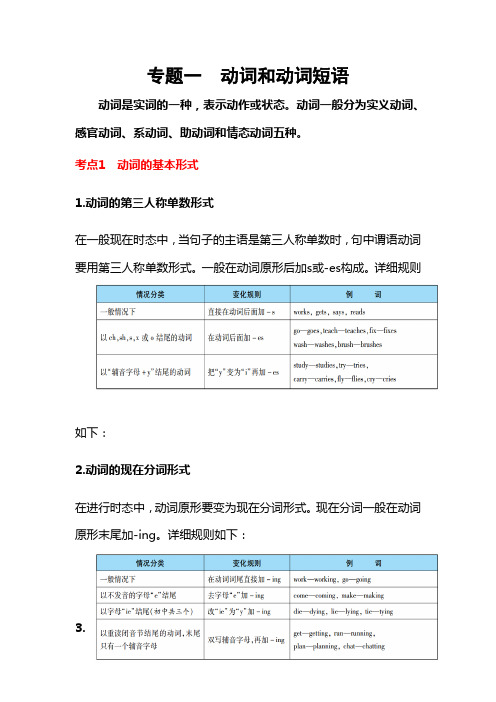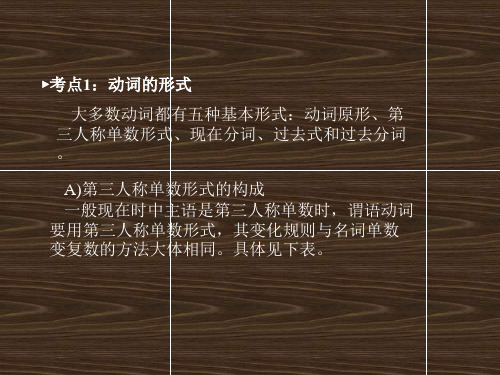初三英语中考专题复习(动词)
中考英语英语专题复习之动词

九年级英语专题四: 动词一、复习目标 1. 动词的分类; 2. 动词的时态和语态; 3. 非谓语动词。
二、复习要点⎩⎪⎪⎪⎪⎪⎪⎨⎪⎪⎪⎪⎪⎪⎧ 动词的分类⎩⎪⎨⎪⎧ 系动词助动词情态动词实义动词(行为动词)⎩⎪⎨⎪⎧ 及物动词不及物动词动词的基本形式⎩⎪⎨⎪⎧ 原形第三人称单数的一般现在时的三种形式现在分词过去式过去分词动词的八种基本时态⎩⎪⎨⎪⎧ 一般现在时、现在进行时、现在完成时、一般过去时过去进行时、过去完成时、一般将来时、过去将来时动词的语态⎩⎪⎨⎪⎧ 主动语态被动语态非谓语动词的形式:动词不定式、动名词、分词主谓一致性原则:意义一致、语法一致、就近原则三、动词可分为四类:行为动词(实义动词)、连系动词、情态动词和助动词1. 行为(实义)动词:实义动词意义完整,能够独立作谓语。
根据其在句中是否需要宾语,又可细分为:及物动词和不及物动词。
(1)及物动词(vt.):a) 后面必须跟宾语意义才完整的实义动词,叫做及物动词(transitive verb)。
I learn_English_every day.(English 是learn 的宾语)b)及物动词可以跟“双宾语”(直接宾语和间接宾语),也可跟“复合宾语”(宾语和宾语补足语)。
People give me their money. 人们给我钱。
In England ,people usually call me Jim for short. 在英国,人们通常简称我Jim 。
I found a small boy cry in the corner yesterday.昨天我发现一个小男孩在角落里哭。
2)不及物动词(vi.):不及物动词:不能直接接宾语,没有被动式的,需加上介词才能接宾语。
如:Birds fly.鸟会飞。
It happened in June 1932.这件事发生于一九三;年六月。
My watch stopped.我的表停了。
中考英语专项复习动词

• C. is pulling
D. has pulled
• 10. Bruce practices C basketball every day
• so that he can be a better player. (2016·海南省)
• A. play
B. to play
• C. playing
The robot has three arms. 这个机器人有三只手臂。
3.过去式:用于一般过去时。其变化规则: (1)一般情况直接加-ed,如:jump — jumped。 (2)以e结尾的直接加-d,如:like — liked。 (3)以“辅音字母加-y”结尾的,改y为i再加-ed,如:
marry — married。 eg:They tried their best to solve the problem.
• tomorrow evening. (2016·重庆市)
• A. cook B. cooks C. cooked D. cooking
• 3. Helen encouraged me to speak English as much as • possible because practice D perfect. (2015·盐城市)
4. Let’s A and help him. (2015·雅安市)
A. go B. going
C. to go D. go to
5. As the story C , the secret of the castle is discovered
little by little. (2016·无锡市)
这蛋糕尝起来很美味。
The leaves turn yellow in autumn. 树叶在秋天变黄了。
中考英语中考英语总复习动词短语知识点梳理及经典练习(超详细)

人教版中考英语中考英语总复习动词短语知识点梳理及经典练习(超详细)一、动词1.— Tina, breakfast is ready. Dad cooked it for us.— It can't be father. He ______ early on Sundays.A. always gets upB. often got upC. had got upD. never gets up【答案】 D【解析】【分析】always gets up总是起床;often got up经常起床;had got up已经起床;never gets up从来不起床。
句意:蒂娜,早饭已经准备好了。
爸爸给我们做的。
——不可能是父亲。
他在周日从来不起床。
故选D。
【点评】考查短语辨析2.—Who reached the station on time?—I ! In fact, I arrived there 5 minutes earlier.A. wasB. reachedC. didD. do【答案】 C【解析】【分析】问句的谓语动词为行为动词reach的过去式,故在作简短回答时,需要借助助动词did.故选C。
句意是:—谁按时到达了车站?—我!实际上我提前五分钟就到了那里。
【点评】本题考查助动词的使用。
3.Thomas Edison was such a great person who never that he made so many great inventions all his life.A. took upB. thought upC. made upD. gave up【答案】 D【解析】【分析】。
句意:爱迪生是如此伟大的人物, 一生中他从来不放弃他做的这么多的发明。
A. took up接收;B. thought up想出;C. made up编造;D. gave up放弃。
根据语意故答案选D。
2024年中考英语专项复习资料归纳之动词

2024年初中英语专项复习资料归纳之英语动词动词是表示行为或状态的词语。
在英语中,动词通常用来表示主语的动作或状态。
例如,“I am studying”(我正在学习)中的“am”是动词,表示主语“我”正在执行动作“学习”。
动词可以分为多种类型,包括:实义动词(real verbs):表示实际动作或状态的动词。
例如,“run”表示奔跑、“eat”表示吃等。
系动词( linking verbs):用来连接主语和表语的动词。
例如,“be”表示存在、“have”表示拥有等。
情态动词(modal verbs):表示能力、意愿、可能性等情态的动词。
例如,“can”表示能够、“will”表示将会等。
助动词(auxiliary verbs):用来帮助构成否定、疑问等语气的动词。
例如,“do”表示 does、“did”表示 did等。
动词不定式(infinitive verb):作为名词使用的一种动词形式。
例如,“to eat”表示“吃”的意思。
动词短语(verb phrase):由一个或多个动词组成的短语。
例如,“studying”表示正在学习的意思。
有些动词需要用被动语态来表达。
原因可能有以下几个方面:强调动作的执行者: 在英语中,有时候需要突出动作的执行者,以强调其重要性或影响。
例如,“The letter, which was written by her, was delivered by the postman”中使用了被动语态来强调邮递员送信的动作是由她写的那封信所引起的。
表示习惯或常规: 在英语中,有时候使用被动语态可以表达习惯或常规。
例如,“The window is always left open in this room”中使用了被动语态来强调这个房间总是开着窗户的。
节省篇幅和语言简洁: 在英语中,有时候使用被动语态可以省略主语,使语言更加简洁。
例如,“I have written many letters”中使用了被动语态来省略主语“I”,使语言更加简洁。
中考英语复习考点讲解:专题 动词和动词短语

专题一动词和动词短语动词是实词的一种,表示动作或状态。
动词一般分为实义动词、感官动词、系动词、助动词和情态动词五种。
考点1 动词的基本形式1.动词的第三人称单数形式在一般现在时态中,当句子的主语是第三人称单数时,句中谓语动词要用第三人称单数形式。
一般在动词原形后加s或-es构成。
详细规则如下:2.动词的现在分词形式在进行时态中,动词原形要变为现在分词形式。
现在分词一般在动词原形末尾加-ing。
详细规则如下:3.动词的过去式和过去分词形式在一般过去时态和完成时态中,动词原形要变为过去式或过去分词形式。
过去式和过去分词形式一般在动词原形末尾加-ed。
详细规则如下:备注:动词的过去式、过去分词的不规则变化形式,没有具体的变化规律,需单独记忆。
考点2 及物动词和不及物动词实义动词具有实在的意义,表示动作或状态,可在句中独立作谓语。
实义动词分为及物动词和不及物动词。
1.及物动词本身意义不完整,需要接宾语才能使其意思表达完整,如reach, ask, return, love, need, teach等。
及物动词常用于下面三种句型中:(1)主语+谓语动词+宾语如:He reached Canada the day before yesterday. 他前天到达加拿大。
(2)主语+谓语动词+宾语+宾语补足语如:They asked me to go fishing with them. 他们让我和他们一起去钓鱼。
(3)主语+谓语动词+间接宾语+直接宾语如:I will return him the storybook. 我准备把故事书还给他。
2.不及物动词本身意思完整,无须接宾语,构成“主语+谓语”结构,如swim, come, go, run, travel等。
如后面接宾语,必须与介词连用。
如:Lucy is swimming. 露西正在游泳。
I am waiting for you at the school gate. 我正在校门口等你。
人教版中考英语专项复习-动词和动词短语

动词和动词短语命题趋势:动词是用来描述主语的动作行为或状态的一类词。
动词在句中作谓语,用来说明主语是什么、处于什么状态或做什么。
动词有不同的形式,这些形式体现了动作发生的时间、语态等信息。
中考对动词的考查方式灵活、题型多样。
在备战2020年中考时,考生要牢记近义动词及动词短语的不同含义,多做练习,在实践中加以区分。
中考考查重点:1.动词辨析;2.动词短语辨析。
考向一:动词的分类考向二:实义动词考向三:连系动词【2020•无锡市】—Hmm,something ________so good.Is it a cake?Can I try some?—Hand-made cookies.Still warm.Here you go!A.feels B.looksC.smellsD.tastes【答案】C【解析】句意:——嗯,某些东西闻起来很香。
是蛋糕吗?我能尝尝吗?——手工制作的饼干。
还带有点温度。
尝尝吧!考查感官动词。
A.feels 感觉到;B.looks 看起来;C.smells 闻起来;D.tastes 尝起来。
根据问句中Is it a cake?Can I try some?提示,提问者并没有摸到、看到或者尝到这个东西,只是闻到了它的气味并进行了猜测,故选C 。
考向四:助动词考向五:动词的甚本形式考向六:动词短语【2020•河北省】Some volunteers are going to the central park.Let's join them.A.put upB.clean upC.look upD.give up【答案】B【解析】句意:一些志愿者打算去清扫中央公园。
让我们加入他们吧。
考查动词短语。
put up张贴;clean up清扫;look up向上看,查阅;give up放弃。
根据空后“the central park”,结合选项可推出是说清扫中央公园,用clean up符合题意。
中考复习英语专题复习课件动词及动词短语

A)第三人称单数形式的构成 一般现在时中主语是第三人称单数时,谓语动词 要用第三人称单数形式,其变化规则与名词单数 变复数的方法大体相同。具体见下表。
1.The temperature ______________( 下降) a lot last night. dropped 2.I haclimbing 爬) the mountain, which is not too high. followed 3.Alice ____________( 跟随) the white rabbit and fell
►考点3:助动词
助动词本身没有意义或意义不完整,不能单独用作谓语 。助动词在句中与实义动词或系动词一起构成谓语,以表 示时态、语态、人称和数的特性。此外,还可以用来构成 否定、疑问或强调的句型。具体用法见下表:
11.The white scarf I bought yesterday is made of silk.It______ feels so soft.
summer holiday? —I am going to ___________( 开始) cooking because I like take up eating delicious food. 26.—Many young people usually offer their seats to the old
on the bus.
—That's good.The old should be _____________( 关心). cared for
down a hole in the ground.
中考复习九年级英语专题复习 题型七 动词(动词短语)

A. put on
B. put up
C. take off
【解析】选C。考查动词短语的辨析。句意: ——今天
太热了。——是的, 你为什么不(脱下)你的夹克? A的意
思为穿上, B的意思为张贴或举起, C的意思为起飞或脱
下。故选C。
③The firemen soon ________ the big fire.
对……感兴趣 做……迟到 与……不同 对……担心 被……覆盖 对……友好
6. 动词+名词 take aim瞄准 lose heart失去信心
take place发生 keep watch值班
【即学活用】
①The little boy ________ his seat to an old lady on the
come over to pass on to get on with
顺便来访 把……传递给…… 与……相处
4. 动词+名词+介词 take care of make sure of have a look at make friends with make fun of pay attention to make use of
以便于我们能避开交通堵塞。avoid避免; plan计划;
follow跟随。
⑧She said she returned the book to the library. I’m
sure she ________ .
A. takes B. did
C. was
【解析】选B。考查替代动词的用法。后半句句意: 我
确信她归还了, 动词did代替过去的动词returned, 故选
B。
eat up吃光
- 1、下载文档前请自行甄别文档内容的完整性,平台不提供额外的编辑、内容补充、找答案等附加服务。
- 2、"仅部分预览"的文档,不可在线预览部分如存在完整性等问题,可反馈申请退款(可完整预览的文档不适用该条件!)。
- 3、如文档侵犯您的权益,请联系客服反馈,我们会尽快为您处理(人工客服工作时间:9:00-18:30)。
初三英语中考专题复习
第七节动词
( ) 1. -- How long may I ______ your book?
--For a week. But you musn’t ______ it to others.
A. borrow; lend
B. keep; lend
C. lend; borrow
D. keep; borrow ( ) 2. It won’t ______ them much time to fly to Beijing from Sha nghai.
A. spend
B. use
C. take
D. pay
( ) 3. Mr Wang ______ be in Nanjing now, he went to Beijing only this morning.
A. mustn’t be
B. may not
C. can’t
D. needn’t
( ) 4. –Do you like the music the Moonlight Sonata? --Yes, it ______ really beautiful.
A. feels
B. sounds
C. listens
D. hears
( ) 5. Lily finished _______ the book yesterday.
A. read
B. reading
C. to read
D. reads
( ) 6. Mrs Brown isn’t here. She has to ______ her baby at home.
A. look at
B. look for
C. look like
D. look after
( ) 7. I have to go now. please remember to _______ the lights when you leave.
A. turn off
B. turn down
C. turn up
D. turn on
( ) 8. Susan’s parents have bought a large house with a swimming pool. It _______ be very expensive.
A. must
B. can
C. mustn’t
D. can’t
( ) 9. –It’s too hot. Would you mind _______ the door? -- _______. Please do it now.
A. to open; OK
B. opening; Certainly not
C. opening; Of course
D. to open; Good idea
( ) 10. I want to _______ this book for a month.
A. borrow
B. keep
C. lend
D. get
( ) 11. –How many times _______ you _______ to Beijing this year? --Three times.
A. have; been
B. had; been
C. have; gone
D. had; gone
( ) 12. What a nice bag! But she _______ only thirty dollars for it.
A. cost
B. took
C. spend
D. paid
( ) 13. Cotton _______ nice and soft.
A. is felt
B. is feeling
C. feel
D. feels
( ) 14. I think this is the best way to solve the problem. Do you _______ me?
A. play with
B. hear of
C. agree with
D. get on well with ( ) 15. –Guess who is coming to supper. – I don’t know. _______ me.
A. Speak
B. Say
C. Tell
D. Tell
( ) 16. Please _______ your phones here with you tomorrow.
A. take
B. bring
C. carry
D. lift
( ) 17. Don’t _______ your lessons. We’ll help you.
A. worry
B. worried about
C. be worried about
D. be afraid
( ) 18. The window is broken. Try to _______ who broke it.
A. find out
B. find
C. look
D. look for
( ) 19. He could _______ neither French nor German. So I ______ with him in English.
A. speak; talked
B. talk; told
C. say; spoke
D. tell; talked ( ) 20. The ticket is on the floor. Would you please _______ for me?
A. pick it up
B. pick up it
C. pick up them
D. pick them up ( ) 21. If you don’t know a word, you must _______ the word in a dictionary.
A. look up
B. look down
C. look over
D. look out
( ) 22. It’s time for class. We’d better _______.
A. stop to talk
B. to stop to talk
C. stop talking
D. to stop talking ( ) 23. There was a strange sound outside. Mary went out and _______ around, but she _______ nothing.
A. looked; saw
B. saw; saw
C. watched; looked
D. looked; find ( ) 24. The woman _______ the child quickly and took him to hospital.
A. put on
B. dressed
C. had on
D. was wearing ( ) 25. –Oh, you painted the walls yourself?
--Yes. It was not hard. The whole work didn’t _______ much.
A. want
B. cost
C. spend
D. pay
( ) 26. --_______ all your things, Tom! I hate them here and there. –OK, Mum.
A. Put up
B. Put on
C. Put down
D. Put away
( ) 27. Yuki loves wearing strange hats because she wants people to _______ her.
A. believe
B. control
C. notice
D. visit
( ) 28. _______! It’s the music of Mozart. Be quiet.
A. Hear
B. Sound
C. Sing
D. Listen
( ) 29. –The room is so dirty. _______ we clean it? -- Of course.
A. Will
B. Would
C. Do
D. Shall
( ) 30. We must do something to stop people from _______.
A. to throw litter about
B. to throw litter into
C. throwing litter about
D. throwing litter into。
